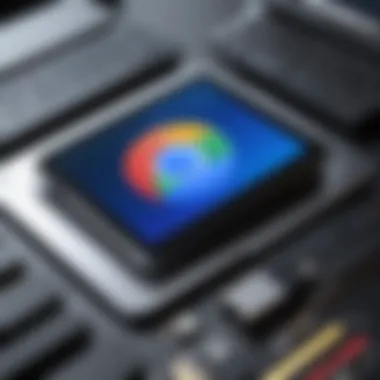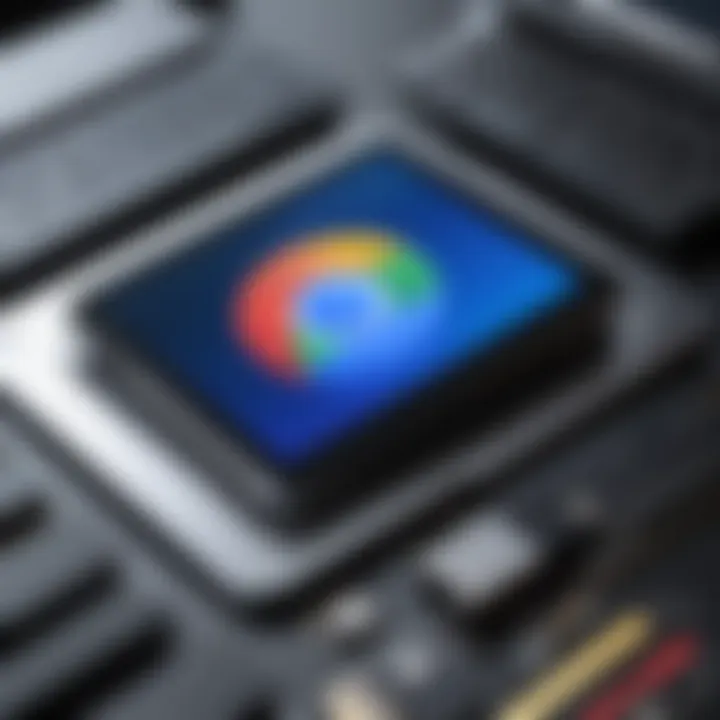Download Emulators for Chromebook: A Complete Guide


Intro
As the digital landscape continues to evolve, Chromebooks have emerged as popular devices among students and professionals alike. Though they are praised for their simplicity and efficiency, users may find themselves longing for the ability to run applications or games that are not natively supported by Chrome OS. This is where emulators come into play, providing a bridge to a wider range of software experiences.
Emulators allow users to replicate conditions of different systems on their Chromebook. This technology opens doors to delightful opportunities, whether for gaming, running alternative operating systems, or testing software. Understanding how these emulators function specifically on Chrome OS, along with their advantages and limitations, can significantly enhance one's device experience.
In this guide, we will dive into the world of emulators designed for Chromebook users. We will examine types of emulators available, their key features, and how to download and install them efficiently. Moreover, we will discuss compatibility factors, performance nuances, and the overall user experience. For both first-timers and experts, this comprehensive outlook aims to empower users to make the most of their devices through emulator usage.
Prelims to Emulators for Chromebook
Understanding emulators on Chromebook is vital for tech enthusiasts and users looking to maximize their device's capabilities. Given the specialized nature of Chrome OS, which is primarily designed for web applications, users often find limitations in accessing a wide range of software, especially those developed for Android or traditional desktop operating systems.
Emulators bridge this gap by allowing users to run applications from different environments effectively. This serves not only as an opportunity to explore various software options but also to enhance the functionality and versatility of a Chromebook. Thus, the introduction of emulators creates a path for users to unlock their device’s potential, enabling them to run games, apps, and programs that ordinarily are not compatible with Chrome OS.
With a clear understanding of what emulators can do, users can explore many choices tailored to their needs. Whether it is for gaming or utilizing specific software tools unavailable on Chrome OS, emulators provide the essential tools to expand and enrich the Chromebook experience.
The following sections of this guide will detail specific types of emulators available, their installation, user experience, and compatibility, which are all crucial aspects for those venturing into the world of emulators on Chromebook.
Understanding Chromebook Limitations
When engaging with emulators on a Chromebook, it is essential to acknowledge the inherent limitations of the Chrome OS platform. Chromebooks, while efficient for many tasks, are not without constraints that can impact the performance of emulators. Understanding these limitations helps in making informed decisions about which apps to use, ensuring a smoother user experience.
Hardware Constraints
Most Chromebooks come with modest hardware specifications when compared to traditional laptops and desktops. The processing power, RAM, and graphics capabilities might fall short for resource-intensive applications, particularly emulators. For example, an Android emulator may require more RAM than a typical Chromebook provides, leading to sluggish performance or crashes.
Software Compatibility
Chromebooks primarily run web applications and Android apps. They are not natively designed to execute software meant for Windows or macOS. This limitation means that users must often rely on alternative methods, such as Linux or Android emulators, to run various applications. However, not all emulators will function effectively within this framework.
Limited Storage Options
Emulators can consume a significant amount of storage, not only for the app itself but also for the virtual machines they may create. Given that many Chromebooks come with limited storage capacity, this can pose a challenge. Managing storage effectively becomes crucial; users must often delete unused apps or files to free up space for emulator downloads and installations.
User Experience Factors
Chromebooks offer a different user experience than traditional operating systems. The interface and interactions can lead to unique challenges when using emulators. For instance, touch controls on a Chromebook may not translate well in environments designed primarily for keyboard and mouse usage. This could frustrate users who are accustomed to seamless functionality on other platforms.
Security Considerations
While Chromebooks are known for their security features, installing emulators may expose users to potential risks. This includes downloading software from unverified sources that could compromise device integrity. Users must remain vigilant and choose emulators endorsed by reputable developers or communities to mitigate these risks.
"Recognizing the limitations of your device plays a crucial role in optimizing your usage and choosing the right emulator for a Chromebook."
Closure
What is an Emulator?
An emulator is a software application or system that enables one computer system to behave like another. This is particularly important when discussing software and applications that are designed for platforms different from the one on which you are running them. In the context of Chromebooks, emulators allow users to run software that was originally created for other operating systems, like Android or various gaming consoles, directly on their Chrome OS devices.
Emulators function by mimicking the hardware and software environment of the target platform. They translate the instructions from the guest system to the host system, ensuring compatibility. This translation is crucial for users who wish to expand their Chromebook's capabilities without needing additional hardware.
Importance of Emulators
The significance of emulators lies in their ability to bridge gaps between various software ecosystems. For Chromebook users, emulators fundamentally alter the usage possibilities of their devices. Here are some of the key points concerning the importance of emulators:
- Access to Diverse Applications: They provide access to a wide range of applications that may not be available natively on Chrome OS. This includes Android apps, PC applications, and even software from gaming consoles.
- Enhanced Functionality: With emulators, users can run various productivity software that enhances their work experience. This can include software for graphic design, coding, or even gaming, which can enrich the user experience.
- Cost-effective: Emulation can offer an alternative to purchasing new hardware. Rather than investing in multiple devices, users can accomplish the same tasks through emulators on their Chromebook.
Considerations for Using Emulators
While the benefits of emulators are compelling, certain considerations must be taken into account:


- Performance Limitations: Emulators may not always run as smoothly as native applications. The performance can depend on the specific emulator and the underlying hardware of the Chromebook.
- System Resource Usage: Running an emulator requires system resources. Users should ensure their device has adequate memory and processing power to handle the additional load without significant lag.
- Security Concerns: Downloading emulators and their related applications from unknown sources can pose security risks. It's vital to verify the security of any emulator before installation.
"Emulators provide access to a broader range of functionality and software on devices, while bridging the compatibility gap between different operating systems."
In short, understanding what an emulator is and how it operates is essential for Chromebook users who wish to maximize their device’s potential. The right emulator can significantly enhance the Chromebook experience by providing functionality that would otherwise be inaccessible.
Types of Emulators Available
Understanding the types of emulators available is essential for enhancing your Chromebook experience. Emulators open new avenues for running applications and games not natively supported by Chrome OS. This section explores the variety of emulators that users can access, along with the benefits and considerations required for making an informed choice. Users can utilize emulators for gaming, running Android apps, or even developing on Linux. Each type serves a distinct purpose and caters to varying user needs.
Android Emulators
Overview of Android Emulators
Android emulators are software that simulate the Android operating system on your Chromebook. This unique capability allows users to run Android apps seamlessly. Their advantages include easy access to a vast library of applications that would otherwise not run on Chrome OS. These emulators are particularly beneficial for users who wish to experience Android applications, such as games or productivity tools, on a larger screen. Performance may vary based on the emulator's design and the Chromebook's specifications.
Popular Android Emulators for Chromebook
Among the various options available, Android emulators like BlueStacks and NoxPlayer stand out. BlueStacks is noted for its user-friendly interface and extensive app compatibility, while NoxPlayer emphasizes keyboard and mouse support, enhancing the gaming experience. Each emulator has its unique features. For instance, BlueStacks offers a synchronized experience with mobile devices. However, users may face issues like slow performance or occasional crashes, depending on their device specifications.
Game Console Emulators
Types of Game Console Emulators
Game console emulators allow users to play games from various consoles on a Chromebook. Popular types include emulators for systems like Nintendo, PlayStation, and Xbox. These emulators recreate console hardware on the Chromebook, making it possible to play classic games directly from your device. A key characteristic of these emulators is their ability to manage different game formats, often requiring specific BIOS files for accurate gameplay. While they can offer nostalgia and a vast library of available games, some may struggle with full compatibility and performance, which could lead to lag or graphical issues.
Steps to Install Game Emulators
Installing game emulators is often straightforward but can vary by emulator. Most include an installer executable, making the process user-friendly. First, users need to download the emulator from a reliable site. Once downloaded, simply run the installer and follow the prompts. Ensuring you have the requisite BIOS files and game ROMs is vital for functionality. While the setup process is generally simple, challenges such as file compatibility or improperly configured settings can arise.
Linux Emulators
Preface to Linux Emulation
Linux emulation on Chromebooks allows users to access a broader range of software not designed for Chrome OS. This aspect is especially critical for developers and tech enthusiasts who require Linux's flexibility and robustness for various applications. The availability of Linux emulators opens doors to programming tools, server software, and rich desktop environments. These emulators operate as a bridge between Chrome OS and Linux, though performance might suffer without sufficient RAM and processing power.
Setting Up a Linux Environment
Setting up a Linux environment is essential for any Chromebook user delving into Linux applications. Users can start by enabling Linux (Beta) in the Chrome settings, which initiates a terminal window and prompts for updates. Once set up, users can install various Linux distributions and software packages. This setup is quite beneficial as it provides an integrated experience directly within Chrome OS. However, users should be cautious about resource limitations, and certain distros might not perform optimally on lower-end Chromebooks.
Benefits of Using Emulators on Chromebook
Using emulators on a Chromebook presents various advantages that can significantly enhance the user experience. This section will elucidate the importance of emulators for Chromebook users. Understanding these benefits is crucial not only for maximizing the device's potential, but also for making informed decisions about app and game choices.
One primary benefit of emulators is their capability to broaden the range of applications and games that a Chromebook can run. Chromebooks primarily operate using web applications and Android apps from the Google Play Store. However, emulators can open pathways to run software from various platforms, including Windows and console games. This versatility is particularly attractive to gamers and developers, as it allows access to a vast library of titles that may not be natively supported on Chrome OS.
Enhanced Performance and Usability
Emulators also optimize performance for specific applications. Many Android emulators are designed to utilize Chromebook's hardware effectively. This results in smoother gameplay and reduced loading times compared to traditional Android devices. Many users have reported experiencing better performance and responsiveness while running applications through emulators.
Environment for Development and Testing
For those in software development, emulators provide a critical environment for testing applications across different platforms without needing to access separate hardware. This is particularly useful for developers looking to create or refine games or applications intended for diverse operating systems.
Emulation can also facilitate learning. Students or self-learners can access educational software typically unavailable on Chrome OS. The ability to run different programming environments can enrich learning opportunities, thereby paving the way for skill enhancement.
Flexibility in Software Choices
Another crucial aspect is the flexibility offered by emulators. Users can customize their experience by selecting various emulators depending on their specific needs or preferences. This includes the selection of screen resolutions, controls, and settings that can cater to individual usage patterns.
Epilogue
In summary, the benefits of using emulators on a Chromebook extend well beyond merely playing games. They include expanded access to important applications, enhanced performance, possibilities for testing and development, and greater customization. As the technology evolves, these advantages will likely grow, making emulators a worthwhile addition for any Chromebook user.


Installation Process for Emulators
The installation process for emulators is crucial for enhancing the functionality of a Chromebook. This step is not just about getting the software on the device; it involves several factors that can significantly impact performance and user experience. Selecting the right emulator, ensuring compatibility, and following a secure download process can make a notable difference in how well an emulator runs on a Chromebook. Understanding these elements is essential for anyone looking to dive deeper into the capabilities of their Chrome OS device.
Choosing the Right Emulator
Factors to Consider
When selecting an emulator for your Chromebook, several key factors come into play. Performance, user interface, and the range of supported applications are top considerations. Each emulator has its strengths and weaknesses. For example, while some may excel in running specific games, others might offer a broader application support. Evaluating the emulator's resource requirements relative to your Chromebook's capabilities is important. This ensures that users do not experience slowdowns or crashes due to overextension. A well-chosen emulator enhances the overall experience, offering more than just basic functionality.
Compatibility with Chromebook
Compatibility is another major aspect to consider. Not all emulators are designed to work seamlessly with Chrome OS. An emulator that performs well on traditional operating systems may not be optimized for Chromebook's architecture. While some emulators provide a wide range of supported features, they might still struggle with compatibility issues. Therefore, choosing an emulator that explicitly lists Chromebook compatibility is essential for ensuring a smooth installation process and functionality.
Downloading an Emulator
Finding Reliable Sources
Finding reliable sources to download emulators is critical for security and functionality. Numerous websites claim to offer the latest versions of different emulators, but not all are trustworthy. Choose websites that have a good reputation and provide clear information about their downloads. This not only reduces the chances of getting malware but also increases the likelihood of receiving a stable application. Trusted sources ensure that the emulator will operate as intended on your device.
Verifying Emulator Security
Once a download source is selected, verifying the security of the emulator is essential. Many emulators may carry hidden threats or not work as advertised. Make use of antivirus software to scan the downloaded file. Furthermore, reading user reviews can provide additional insights into the safety and reliability of the software. A little precaution can protect your Chromebook and enhance your emulator experience, making this step vital in the wider installation process.
Installation Steps
Detailed Installation Instructions
Following detailed installation instructions is important for a successful emulator setup. Most emulators provide user guides that walk you through the installation process. It is vital to follow these steps closely to avoid complications. A common approach involves downloading the installer, opening it, and then following on-screen prompts. Some emulators might require additional configurations, such as adjusting settings after installation. Knowing what to expect and how to proceed can save time and frustration.
Troubleshooting Common Installation Issues
Even when following instructions, users may encounter installation issues. Common problems include compatibility errors, system crashes, or issues with required permissions. Troubleshooting these problems can sometimes be challenging. Always consult the emulator's help resources, as most have dedicated forums or support centers. Additionally, community forums such as Reddit can provide valuable troubleshooting tips from other users who faced similar issues. Having ways to resolve installation problems enhances the user's ability to utilize the emulator effectively.
User Experience with Emulators
User experience is a critical component when discussing emulators for Chromebooks. This section will explore how emulators can influence usability, convenience, and overall functionality. A positive user experience often translates to smoother gameplay, better productivity, and enhanced satisfaction with technology. On the contrary, a poor experience can lead to frustration and may deter users from exploring further applications. Thus, understanding user experience is an integral part of making the best choice for an emulator.
Performance Aspects
Speed and Responsiveness
Speed and responsiveness are key attributes in evaluating any emulator. They determine how quickly and efficiently applications run on a Chromebook. An emulator that is responsive can enhance the user experience significantly. For instance, many users prefer fast emulators because they reduce lag, leading to uninterrupted gameplay or workflow.
A notable characteristic of speed is its potential to allow users to multitask without disruption. Emulators that are optimized for speed often utilize system resources more effectively. This results in a noticeable improvement in performance. The downside might arise when speed optimizations limit features or reduce compatibility with certain applications. Users need to weigh these factors based on their individual needs.
System Resource Usage
System resource usage relates to how much of the Chromebook’s CPU and memory is consumed by the emulator. An emulator that efficiently uses system resources can operate seamlessly without draining your device. Chromebook users value emulators that maintain lower memory consumption while still delivering high performance.
A critical aspect of this consideration is the balance between functionality and resource requirements. Emulators that are resource-intensive may provide richer features but at the cost of system stability. Conversely, those that are lightweight might support fewer functionalities. Hence, it is essential to analyze which resources the emulator demands and how that aligns with what your Chromebook can handle.
Gameplay and Functionality
Integration with Chromebook Features
Integration with Chromebook features is vital for enhancing user experience. Emulators that align with native features—like touchpads, keyboards, and the Chrome OS interface—offer a streamlined experience. This integration tends to create a sense of familiarity, making users feel more comfortable.
Highlighting this integration points to how well an emulator utilizes the Chromebook's capabilities. For example, an emulator that can support keyboard shortcuts or gestures can enhance gameplay significantly. However, limitations may exist if an emulator does not fully utilize Chromebook features, potentially leading to user frustration.
User Feedback and Reviews
User feedback and reviews provide valuable insights into the performance and satisfaction levels associated with different emulators. These elements can help shape potential users’ decisions. Positive reviews often highlight aspects such as stability, speed, and compatibility, which can be rather persuasive.


A unique feature of user feedback is its real-world application in understanding how emulators perform under various conditions. However, it is crucial to approach this feedback critically. Individual experiences may vary depending on specific Chromebook models and usage scenarios. Therefore, potential users should consider multiple perspectives before making a choice.
Potential Challenges and Limitations
Emulators provide an exciting means to expand the capabilities of a Chromebook. However, they also come with an array of challenges and limitations that users must navigate. Understanding these aspects is critical for anyone looking to enhance their Chromebook experience through emulators. Potential challenges can hinder overall usage and performance, making it essential to prepare for them in advance.
Common Issues Encountered
When using emulators on Chromebooks, users frequently face a few common issues. These issues can significantly impact the overall effectiveness and usability of the emulator experience.
Compatibility Problems
Compatibility problems are perhaps the most prevalent issue when it comes to running emulators on Chromebook devices. Many emulators are designed primarily for Windows or macOS platforms, which can lead to adaptation challenges in the Chromebook environment. This incompatibility can result in errors during installation or, worse, lead to an emulator that does not function as expected.
The key characteristic of compatibility problems is that they stem from differences in operating systems. Because Chromebooks utilize Chrome OS, the reliance on app compatibility becomes paramount to the overall experience. Often, an emulator will not function properly unless it has been specifically optimized for Chromebooks.
One major advantage of understanding compatibility problems is that users can make informed choices regarding which emulators to download. Knowledge of this issue can save time and effort, steering users toward options that have a proven track record with Chrome OS. However, if this aspect is ignored, users may encounter unusable applications which detracts from their experience.
Performance Lag Issues
Performance lag issues are another significant concern for emulator users on Chromebooks. Lag can manifest as delays in response time, stuttering visuals, or prolonged loading screens. These performance problems can arise from the emulator itself or due to the limitations of the Chromebook hardware.
The key characteristic of performance lag issues is that they often correlate with the resource demands of the emulator application. Running games or apps that require high processing power may lead to frustrating slowdowns since Chromebooks typically have limited hardware compared to traditional computers.
Understanding the potential for performance lag is beneficial in several ways. Users can anticipate such issues and thus adjust their expectations accordingly. It can also motivate users to seek out lighter applications or to modify settings to alleviate some of the lag. However, if left unaddressed, performance lag can severely limit the enjoyment and functionality of the emulator.
"Being aware of the potential challenges allows Chromebook users to better strategize their choices and enrich their emulator experience."
Future Trends in Emulator Technology
The realm of emulator technology is continually evolving. As users seek more functionality from their Chrome OS devices, it becomes crucial to understand these future trends in emulation. The significance of this topic lies in its potential to enhance user experience by providing access to applications and games that are otherwise unavailable on Chromebooks. With advancements in technologies, emulators can deliver better performance, improved usability, and wider compatibility.
Two prominent trends in emulator technology are cloud-based emulators and cross-platform functionality. These emerging technologies are poised to redefine how users interact with applications on their devices, making it essential for users to stay informed.
Emerging Technologies
Cloud-based Emulators
Cloud-based emulators represent a significant shift in how applications are accessed and used. They allow users to run emulated environments directly from the cloud, eliminating the need for local installation on devices like Chromebooks. This characteristic makes cloud-based emulators a popular choice for users with limited storage or processing power. The unique feature of these emulators is the ability to stream applications, enabling users to access high-performance gaming and software without bulky downloads or installations.
The advantages of cloud-based emulators include:
- Reduced Local Resource Usage: Since the processing occurs in the cloud, users can conserve their Chromebook's resources.
- Accessibility: As long as there's an internet connection, users can access their emulated environment from any device.
However, potential disadvantages are just as significant. Dependence on internet connection can cause latency issues. Similarly, not all applications may perform well when streamed.
Cross-platform Functionality
Cross-platform functionality allows emulators to operate across different operating systems. This trend is vital as users increasingly demand versatility in how they use different devices, including their Chromebooks. The key characteristic of cross-platform emulators is their ability to run games and applications from multiple platforms without needing modifications. This feature broadens the landscape of what users can access.
Benefits of cross-platform functionality include:
- Wider Library Access: Users can engage with diverse applications from various platforms.
- Enhanced Social Interaction: Cross-platform emulators facilitate gaming with friends regardless of the device they use.
Nevertheless, challenges exist. Some applications may not perform equally well across every platform, leading to inconsistent user experiences. Taking these considerations into account will empower users to make informed decisions about which technologies to adopt in the future.
In summary, as emulator technology advances, both cloud-based options and cross-platform functionalities are set to enhance the usability and access of applications for Chromebook users. Staying updated on these trends will optimize the Chromebook experience, offering more seamless and integrated solutions.
Finale
In this article, we have explored the various aspects of using emulators on Chromebook devices. Understanding the role of emulators is crucial for users who wish to expand their Chromebook's capabilities beyond its native applications. First, it is essential to recognize the importance of selecting the right emulator. Compatibility plays a significant role in ensuring that the emulator runs smoothly on your device. Factors such as system requirements, user interface, and specific features are vital considerations.
Moreover, the installation process was outlined, emphasizing the need for reliable sources and security verification. This step is crucial to avoid malware and ensure a safe experience. Realization of a streamlined installation can significantly enhance the user's productivity and enjoyment.
User experience with emulators is another key point. Performance issues can arise, so understanding the potential lag or compatibility problems is important to set realistic expectations. Feedback from other users provides useful insights into what can be achieved and helps in making informed choices.
Looking to the future, emerging technologies in emulator development signify that we are only at the beginning of what can be achieved on Chromebook. Cloud-based solutions and cross-platform functionality are becoming significant trends.
Ultimately, this comprehensive guide serves to empower both newcomers and experienced users in maximizing their Chromebook experience through the use of emulators. By providing detailed information on selection, installation, and potential issues, we create a well-rounded understanding that can lead to better user satisfaction. Embracing these tools opens up a world of possibilities for innovation and education.



